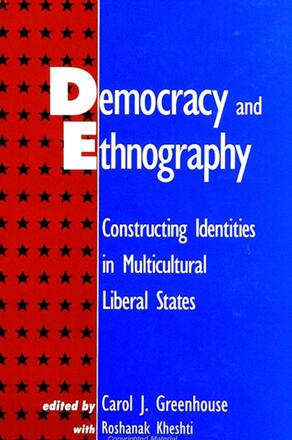
Democracy and Ethnography
Constructing Identities in Multicultural Liberal States
Alternative formats available from:
Examines the contemporary connections between liberal democracy and ethnography through the development of national case studies on the United States and Spain.
Description
These ethnographic essays by scholars in anthropology, law, political science, folklore, public administration, medicine, and linguistics show contemporary connections between liberal democracy and ethnography. Each perspective explores a modern democratic site—courts, classrooms, legislatures, the media, academic professions, and bureaucratic routines. Together, they expose a contradiction—that official constructions of identity treat "differences" as both natural characteristics of individuals and the collective basis of interest groups. This contradiction hampers liberal states' efforts to acknowledge and accommodate the cultural diversity of citizens. They also show that official categories do not monopolize the available terms of understanding and identification, given the richness and flexibility of people's self-identifications outside official spheres. This recognition implies an ethnographic project at the heart of democratic change.
The book develops two national case studies, the United States and Spain. Both countries have been invoked as models of multiculturalism, but their constitutional discourse and politics take very different approaches to issues of identity. Similarly, ethnographic disciplines have been involved in the officialization of difference in both countries, in different ways. Taken together, these differences and their common roots in the twinned histories of modern liberal democracy and the social sciences, provide ethnographic, reflexive, and comparative themes as well as broader theoretical and practical implications.
Carol J. Greenhouse is Professor of Anthropology at Indiana University at Bloomington. She is the author of Praying for Justice: Faith, Hope and Community in an American Town and A Moment's Notice: Time Politics Across Cultures, and coauthor (with Barbara Yngvesson and David Engel) of Law and Community in Three American Towns.
Reviews
"In exploring the official constructions of cultural diversity in the United States and Spain, this book makes a valuable contribution to debates on multicultural policies in liberal democratic states. It brings anthropological insights on classification to bear on the pressing issues of affirmative action, immigration quotas, education, and the political organization of difference. " — John Borneman, Cornell University
"How do democracies deal with difference? This intriguing, provocative collection of essays explores how democracies accommodate the tensions between equality and diversity through a comparison of the United States and Spain. It is essential reading for scholars concerned with the challenges and dilemmas posed by multicultural societies within democratic states. " — Sally Engle Merry, Wellesley College